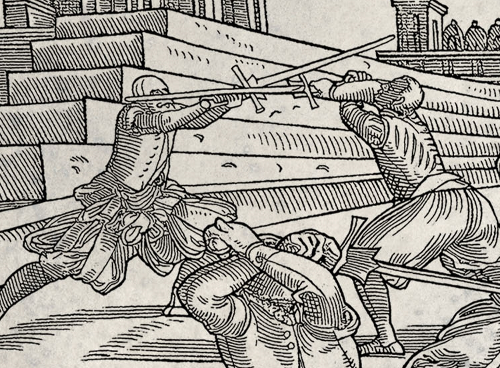Kurtzhauw
From Scholar Victoria
(Difference between revisions)
(→Application 1: Kurtzhauw Parry) |
|||
| (10 intermediate revisions by one user not shown) | |||
| Line 3: | Line 3: | ||
A secondary cut which shares much in common with the early german technique which break the guard ochs. The cut is a version of the [[krumphauw]] which preemptively cuts underneath an [[oberhauw]] with a short cut to the head. | A secondary cut which shares much in common with the early german technique which break the guard ochs. The cut is a version of the [[krumphauw]] which preemptively cuts underneath an [[oberhauw]] with a short cut to the head. | ||
| − | + | ==Execution== | |
The interpretation of the canonical description of this strike is executed as follows: | The interpretation of the canonical description of this strike is executed as follows: | ||
| Line 12: | Line 12: | ||
[[File:MeyerKurtzhauw.png | center]] | [[File:MeyerKurtzhauw.png | center]] | ||
| + | |||
| + | ==Applications== | ||
In which the 'student' demonstrates their knowledge to the 'teacher'. | In which the 'student' demonstrates their knowledge to the 'teacher'. | ||
| − | {| class="wikitable" | + | === Application 1: Kurtzhauw=== |
| + | |||
| + | In this application the cut is being used simultaneously as a [[Provoker, Hitter, & Taker|Taker]] and [[Provoker, Hitter, & Taker|Hitter]] in the [[Stages of the Exchange|Onset]]. In this case the fencer is acting in the [[Vor, Nach, Indes, & Gleich|Nach]]. | ||
| + | |||
| + | {| class="wikitable" style="margin-left: auto; margin-right: auto; border: none;" | ||
|- | |- | ||
! Teacher | ! Teacher | ||
! Student | ! Student | ||
|- | |- | ||
| − | | [[ | + | | [[Ochs]], left leg forward |
| − | | [[ | + | | [[Mittelhut]] or [[Nebenhut]], left leg forward |
|- | |- | ||
| − | | [[Passing Step]] [[Oberhauw]] | + | | Lift through [[Vom tag]] and take a [[Passing Step]] with the right foot, to cut an [[Oberhauw]] |
| − | | [[Krumphauw]] without a step short under their blade angled sharply toward the opponent (this looks almost likes a [[sturtzhauw]]), lifting the hands high to collect theirs on the way down, and slice/cut their head. | + | | As soon as they lift to [[Vom tag]], [[Krumphauw]] without a step short under their blade angled sharply toward the opponent (this looks almost likes a [[sturtzhauw]]), lifting the hands high to collect theirs on the way down, and slice/cut their head. |
| + | |- | ||
| + | | | ||
| + | | Withdraw ([[Abzug]]) with a defensive high cut or a guard. | ||
|} | |} | ||
| + | |||
| + | Perform this from both sides | ||
Latest revision as of 06:26, 1 October 2018
Contents |
[edit] Short Cut
A secondary cut which shares much in common with the early german technique which break the guard ochs. The cut is a version of the krumphauw which preemptively cuts underneath an oberhauw with a short cut to the head.
[edit] Execution
The interpretation of the canonical description of this strike is executed as follows:
- Standing in left forward weighted posture
- As the opponent goes up for a strike overhead passing step forward and cut a krumphauw quite tight and short and cut "forward" in the strike so it lands with a short cutting/slicing action to their head.
- If the opponent cuts down ensure the hands are lifted high so the high guard parries their incoming blow.
[edit] Applications
In which the 'student' demonstrates their knowledge to the 'teacher'.
[edit] Application 1: Kurtzhauw
In this application the cut is being used simultaneously as a Taker and Hitter in the Onset. In this case the fencer is acting in the Nach.
| Teacher | Student |
|---|---|
| Ochs, left leg forward | Mittelhut or Nebenhut, left leg forward |
| Lift through Vom tag and take a Passing Step with the right foot, to cut an Oberhauw | As soon as they lift to Vom tag, Krumphauw without a step short under their blade angled sharply toward the opponent (this looks almost likes a sturtzhauw), lifting the hands high to collect theirs on the way down, and slice/cut their head. |
| Withdraw (Abzug) with a defensive high cut or a guard. |
Perform this from both sides
